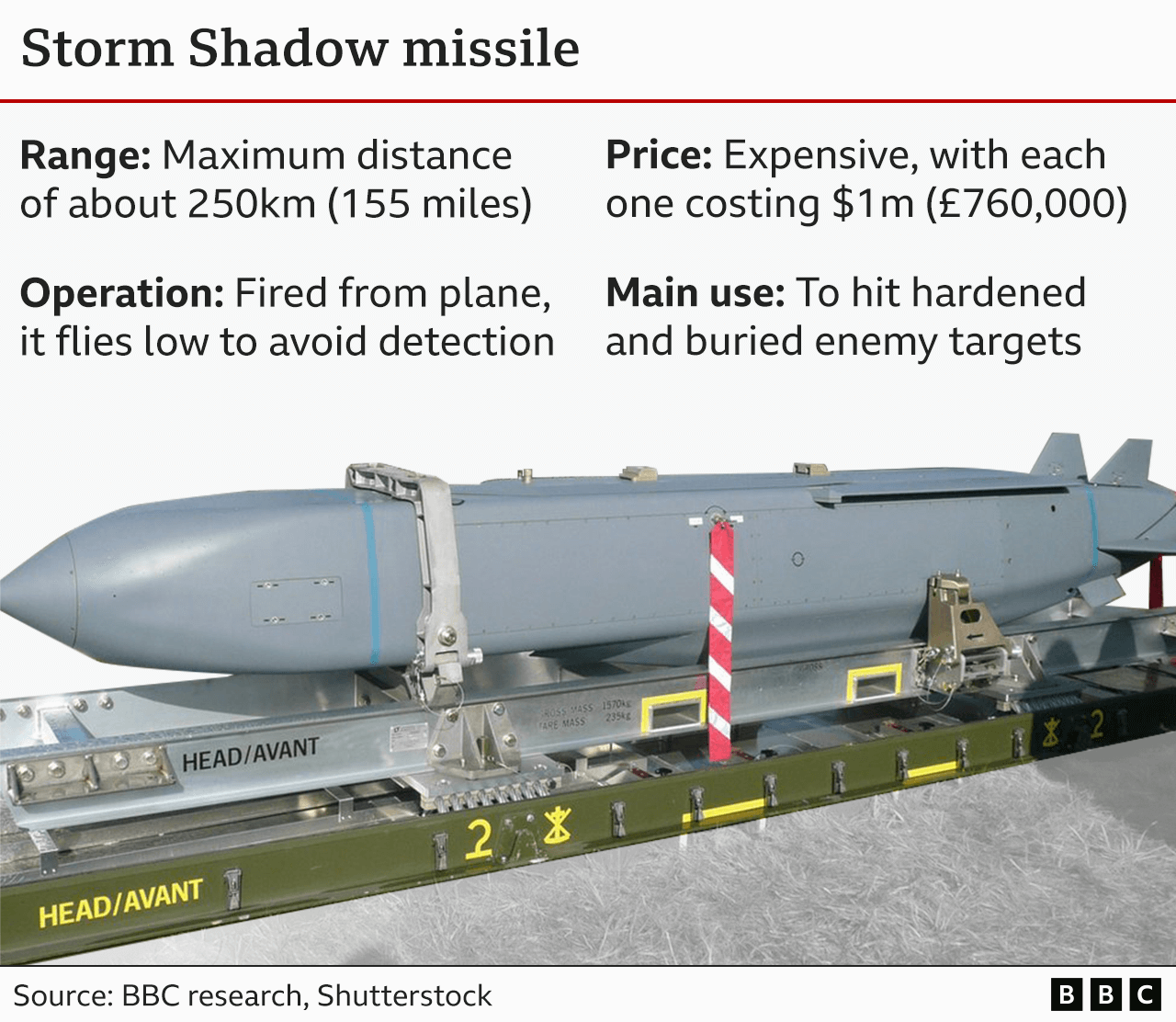Ukraine missile request under discussion - Lammy
Lammy: 'No single weapon has won any war'
- Published
The foreign secretary has insisted no single weapon can win a war, as he said the UK was still discussing with allies whether to allow Ukraine to fire long-range missiles into Russia.
David Lammy told the BBC it was important that countries supporting Ukraine had "a shared strategy to win".
Ukraine already has supplies of long-range missiles from the UK, the United States and France but at the moment it is only allowed to fire them at targets within its own borders.
President Zelensky has been pleading for months for these restrictions to be lifted so Ukraine can use them against targets inside Russia.
What are Storm Shadow missiles and why are they crucial for Ukraine?
- Published20 November 2024
No new pledge on Ukraine missiles after Starmer-Biden talks
- Published14 September 2024
Putin draws new red line on long-range missiles
- Published13 September 2024
There have been strong indications that the US and UK are poised to change their position.
However, no confirmation came after talks between Prime Minister Sir Keir Starmer and US President Joe Biden in Washington on Wednesday.
Pressed over whether the delay in lifting restrictions on the use of long-range missiles was emboldening Russian President Vladimir Putin, Mr Lammy told the BBC's Sunday with Laura Kuenssberg programme: "No war is won with any one weapon."
He refused to confirm whether the UK and its allies were planning to allow missiles to be used against targets in Russia.
But he added: "This is under careful discussion with the Ukrainians, as we assess what they need as they head into the winter."
Lammy said the UK and other allies would be meeting President Zelensky at the United Nations General Assembly in New York in less than 12 days' times and suggested the issue would be discussed then.
Liberal Democrat leader Sir Ed Davey said Ukraine should be allowed to use long-range missiles to attack military bases inside Russia, even if the UK had to act "unilaterally".
Asked whether the UK would "go it alone" and lift restrictions without US support, Lammy told the BBC "it’s important that as allies supporting Ukraine we have a shared strategy to win going forward".
Gen Sir John McColl, former deputy supreme allied commander Europe of Nato, said he believed Ukraine would eventually be allowed to use long-range missiles against targets in Russia.
But he told the programme Ukraine’s allies needed to be "firm" and "not signal this kind of dither and dilemma".
"At the end of the weekend President Putin will be encouraged and emboldened and President Zelensky will be disappointed," he said.
However, Sir John said the missiles would have only "a limited effect" on the war as a whole.
A number of former Conservative defence secretaries, including Ben Wallace, have urged the PM to lift restrictions.
On Saturday, he told BBC Radio 4’s Today programme the delays and wrangling over the decision were only benefitting President Putin.

Earlier this week President Putin warned Western nations against allowing Ukraine to fire long-range missiles into Russia, saying this would represent "direct participation" by Nato in the war.
Ukraine’s allies have been reluctant to do anything which could drag them into direct conflict with Moscow.
Lammy accused the Russian president of "throwing dust up into the air" by making such threats.
"There’s a lot of bluster – that’s his modus operandi," he said.
"We cannot be blown off course by an imperialist fascist."
Since Russia launched its full-scale invasion of Ukraine in February 2022, Ukrainian cities and front lines have been under regular bombardment.
Many of these missiles are launched by aircraft deep inside Russia and Kyiv says not being allowed to hit the bases from which these attacks are launched hinders its ability to defend itself.
On Sunday, President Zelensky posted a fresh plea on social media, writing: "This week, the Russians have launched around 30 missiles of various types, more than 800 guided aerial bombs, and nearly 300 strike drones against Ukraine.
"Ukraine needs strong support from our partners to defend lives against Russian terror - air defence, long-range capabilities, support for our warriors. Everything that will help force Russia to end this war."